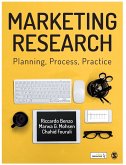- Broschiertes Buch
- Merkliste
- Auf die Merkliste
- Bewerten Bewerten
- Teilen
- Produkt teilen
- Produkterinnerung
- Produkterinnerung
Conducting Online Research on Amazon Mechanical Turk and Beyond, by Leib Litman and Jonathan Robinson, provides researchers with step-by-step technical information on this important research platform. The book gives a broad view of the MTurk ecosystem and customs, hones in on common researcher pitfalls, and provides detailed data on sampling, ethics, and experimentation.
Andere Kunden interessierten sich auch für
![Basic and Advanced Focus Groups Basic and Advanced Focus Groups]() David L. MorganBasic and Advanced Focus Groups77,99 €
David L. MorganBasic and Advanced Focus Groups77,99 €![Conducting Research Literature Reviews Conducting Research Literature Reviews]() Arlene G. Fink (UCLA, Los Angeles, USA)Conducting Research Literature Reviews107,99 €
Arlene G. Fink (UCLA, Los Angeles, USA)Conducting Research Literature Reviews107,99 €![Marketing Research Marketing Research]() Riccardo BenzoMarketing Research139,99 €
Riccardo BenzoMarketing Research139,99 €![The Mixed Methods Research Workbook The Mixed Methods Research Workbook]() Michael D. FettersThe Mixed Methods Research Workbook83,99 €
Michael D. FettersThe Mixed Methods Research Workbook83,99 €![Davos Man Davos Man]() Peter S. GoodmanDavos Man18,99 €
Peter S. GoodmanDavos Man18,99 €![Conducting Research in Psychology Conducting Research in Psychology]() Brett W. PelhamConducting Research in Psychology168,99 €
Brett W. PelhamConducting Research in Psychology168,99 €![Marketing Marketing]() Rosalind MastersonMarketing122,99 €
Rosalind MastersonMarketing122,99 €-
-
-
Conducting Online Research on Amazon Mechanical Turk and Beyond, by Leib Litman and Jonathan Robinson, provides researchers with step-by-step technical information on this important research platform. The book gives a broad view of the MTurk ecosystem and customs, hones in on common researcher pitfalls, and provides detailed data on sampling, ethics, and experimentation.
Hinweis: Dieser Artikel kann nur an eine deutsche Lieferadresse ausgeliefert werden.
Hinweis: Dieser Artikel kann nur an eine deutsche Lieferadresse ausgeliefert werden.
Produktdetails
- Produktdetails
- SAGE Innovations in Research Methods
- Verlag: SAGE Publications Inc
- Seitenzahl: 296
- Erscheinungstermin: 29. Mai 2020
- Englisch
- Abmessung: 231mm x 185mm x 16mm
- Gewicht: 528g
- ISBN-13: 9781506391137
- ISBN-10: 1506391133
- Artikelnr.: 58292841
- Herstellerkennzeichnung
- Libri GmbH
- Europaallee 1
- 36244 Bad Hersfeld
- gpsr@libri.de
- SAGE Innovations in Research Methods
- Verlag: SAGE Publications Inc
- Seitenzahl: 296
- Erscheinungstermin: 29. Mai 2020
- Englisch
- Abmessung: 231mm x 185mm x 16mm
- Gewicht: 528g
- ISBN-13: 9781506391137
- ISBN-10: 1506391133
- Artikelnr.: 58292841
- Herstellerkennzeichnung
- Libri GmbH
- Europaallee 1
- 36244 Bad Hersfeld
- gpsr@libri.de
Leib Litman received a PhD in experimental psychology from the City University of New York. His early research was in the area of implicit learning, focusing on the relationship between conscious and unconscious information processing. After receiving his PhD, he was a postdoctoral fellow and research scientist in cognitive neuroscience at New York University, where he studied episodic memory using fMRI. Leib's current methodological research interests are in the area of online data collection, especially in the application of online data collection tools to complex research designs, such as dyadic studies, experience sampling, intensive longitudinal designs, qualitative video and focus group interviews, and global data collection. Leib is currently an associate professor of psychology at Lander College in Queens, New York, and director of research at CloudResearch.com (formerly TurkPrime). Leib lives in Riverdale, New York, with his wife, Sarah, and their two girls, Bella and Rebecca.
Chapter 1: Introduction
A Scientific Revolution in the Making
A Brief History of Online Research in the Social and Behavioral
Sciences: From HTML 2.0 to Mechanical Turk
The Use of Online Samples in Applied Behavioral Research
Amazon Mechanical Turk
Chapter 2: The Mechanical Turk Ecosystem - Leib Litman, Cheskie Rosenzweig,
Jonathan Robinson
How Quality is Maintained
Reputation Mechanism
Selectively Recruiting Specific Workers
Protections for Workers
Communicating with Workers
A Worker's Perspective
Worker Communities
Chapter 3: Conducting a Study on Mechanical Turk
Sample Project
Setting up a Requester Account on Mechanical Turk
Creating a HIT
The 'Design Layout' tab
Monitoring Progress on the Requester's Dashboard
When a Worker Runs Out of Time
Sample Study Results
Conducting Follow-up Studies Using Requester-Issued Qualifications
Appendix A: Checklist for best practices of setting up a Mechanical Turk
HIT
Chapter 4: API and Third Party Apps
Third Party API-based Platforms
Common Uses for API Scripts and Third Party API-based Apps
TurkPrime
Chapter 5: Data Quality Issues on MTurk - Jesse Chandler, Gabriele
Paolacci, David Hauser
Defining and Measuring Data Quality
Measuring Individual Participant Data Quality
Causes of and Cures for Poor Data Quality
Concluding Thoughts
Chapter 6: Who are the Mechanical Turk Workers?
Sources of Data
Location of Workers in the US
Demographics of Mechanical Turk
Chapter 7: Sampling Mechanical Turk Workers: Problems and Solutions
Sampling on Mechanical Turk
Sources of Sampling Bias
The Problem of Superworkers
Time-of-day Effects
Pay Rate
Dropout
Sampling Best Practices
Chapter 8: Data Representativeness of Mechanical Turk Samples
Representativeness, surveys, and survey sampling
The methodology of survey sampling
Mechanical Turk as a sampling frame
The fit-for-purpose framework
Chapter Overview:
Chapter 9: Conducting Longitudinal Research on Amazon Mechanical Turk
Why Longitudinal Research?
Retention, Longitudinal Research, and MTurk
Case Studies
Best practices for longitudinal research
Chapter 10: Beyond Mechanical Turk: Using Online Market Research Platforms
Limitations of MTurk
Online probability-based panels
Online market research platforms
Overall comparisons between Mechanical Turk and market research platforms
Chapter 11: Conducting Ethical Online Research: A Data-Driven Approach
Historical background
Risk of harm in online research
Research on sensitive topics
A deeper dive into controversial and complex issues
Economics of Mechanical Turk: Considerations for setting wages
Setting wages: Considerations of ethics and methodology
Considerations for rejecting, blocking and disqualifying workers.
Practical advice for requester/worker interactions
Anonymity
Appendix A
A Scientific Revolution in the Making
A Brief History of Online Research in the Social and Behavioral
Sciences: From HTML 2.0 to Mechanical Turk
The Use of Online Samples in Applied Behavioral Research
Amazon Mechanical Turk
Chapter 2: The Mechanical Turk Ecosystem - Leib Litman, Cheskie Rosenzweig,
Jonathan Robinson
How Quality is Maintained
Reputation Mechanism
Selectively Recruiting Specific Workers
Protections for Workers
Communicating with Workers
A Worker's Perspective
Worker Communities
Chapter 3: Conducting a Study on Mechanical Turk
Sample Project
Setting up a Requester Account on Mechanical Turk
Creating a HIT
The 'Design Layout' tab
Monitoring Progress on the Requester's Dashboard
When a Worker Runs Out of Time
Sample Study Results
Conducting Follow-up Studies Using Requester-Issued Qualifications
Appendix A: Checklist for best practices of setting up a Mechanical Turk
HIT
Chapter 4: API and Third Party Apps
Third Party API-based Platforms
Common Uses for API Scripts and Third Party API-based Apps
TurkPrime
Chapter 5: Data Quality Issues on MTurk - Jesse Chandler, Gabriele
Paolacci, David Hauser
Defining and Measuring Data Quality
Measuring Individual Participant Data Quality
Causes of and Cures for Poor Data Quality
Concluding Thoughts
Chapter 6: Who are the Mechanical Turk Workers?
Sources of Data
Location of Workers in the US
Demographics of Mechanical Turk
Chapter 7: Sampling Mechanical Turk Workers: Problems and Solutions
Sampling on Mechanical Turk
Sources of Sampling Bias
The Problem of Superworkers
Time-of-day Effects
Pay Rate
Dropout
Sampling Best Practices
Chapter 8: Data Representativeness of Mechanical Turk Samples
Representativeness, surveys, and survey sampling
The methodology of survey sampling
Mechanical Turk as a sampling frame
The fit-for-purpose framework
Chapter Overview:
Chapter 9: Conducting Longitudinal Research on Amazon Mechanical Turk
Why Longitudinal Research?
Retention, Longitudinal Research, and MTurk
Case Studies
Best practices for longitudinal research
Chapter 10: Beyond Mechanical Turk: Using Online Market Research Platforms
Limitations of MTurk
Online probability-based panels
Online market research platforms
Overall comparisons between Mechanical Turk and market research platforms
Chapter 11: Conducting Ethical Online Research: A Data-Driven Approach
Historical background
Risk of harm in online research
Research on sensitive topics
A deeper dive into controversial and complex issues
Economics of Mechanical Turk: Considerations for setting wages
Setting wages: Considerations of ethics and methodology
Considerations for rejecting, blocking and disqualifying workers.
Practical advice for requester/worker interactions
Anonymity
Appendix A
Chapter 1: Introduction
A Scientific Revolution in the Making
A Brief History of Online Research in the Social and Behavioral
Sciences: From HTML 2.0 to Mechanical Turk
The Use of Online Samples in Applied Behavioral Research
Amazon Mechanical Turk
Chapter 2: The Mechanical Turk Ecosystem - Leib Litman, Cheskie Rosenzweig,
Jonathan Robinson
How Quality is Maintained
Reputation Mechanism
Selectively Recruiting Specific Workers
Protections for Workers
Communicating with Workers
A Worker's Perspective
Worker Communities
Chapter 3: Conducting a Study on Mechanical Turk
Sample Project
Setting up a Requester Account on Mechanical Turk
Creating a HIT
The 'Design Layout' tab
Monitoring Progress on the Requester's Dashboard
When a Worker Runs Out of Time
Sample Study Results
Conducting Follow-up Studies Using Requester-Issued Qualifications
Appendix A: Checklist for best practices of setting up a Mechanical Turk
HIT
Chapter 4: API and Third Party Apps
Third Party API-based Platforms
Common Uses for API Scripts and Third Party API-based Apps
TurkPrime
Chapter 5: Data Quality Issues on MTurk - Jesse Chandler, Gabriele
Paolacci, David Hauser
Defining and Measuring Data Quality
Measuring Individual Participant Data Quality
Causes of and Cures for Poor Data Quality
Concluding Thoughts
Chapter 6: Who are the Mechanical Turk Workers?
Sources of Data
Location of Workers in the US
Demographics of Mechanical Turk
Chapter 7: Sampling Mechanical Turk Workers: Problems and Solutions
Sampling on Mechanical Turk
Sources of Sampling Bias
The Problem of Superworkers
Time-of-day Effects
Pay Rate
Dropout
Sampling Best Practices
Chapter 8: Data Representativeness of Mechanical Turk Samples
Representativeness, surveys, and survey sampling
The methodology of survey sampling
Mechanical Turk as a sampling frame
The fit-for-purpose framework
Chapter Overview:
Chapter 9: Conducting Longitudinal Research on Amazon Mechanical Turk
Why Longitudinal Research?
Retention, Longitudinal Research, and MTurk
Case Studies
Best practices for longitudinal research
Chapter 10: Beyond Mechanical Turk: Using Online Market Research Platforms
Limitations of MTurk
Online probability-based panels
Online market research platforms
Overall comparisons between Mechanical Turk and market research platforms
Chapter 11: Conducting Ethical Online Research: A Data-Driven Approach
Historical background
Risk of harm in online research
Research on sensitive topics
A deeper dive into controversial and complex issues
Economics of Mechanical Turk: Considerations for setting wages
Setting wages: Considerations of ethics and methodology
Considerations for rejecting, blocking and disqualifying workers.
Practical advice for requester/worker interactions
Anonymity
Appendix A
A Scientific Revolution in the Making
A Brief History of Online Research in the Social and Behavioral
Sciences: From HTML 2.0 to Mechanical Turk
The Use of Online Samples in Applied Behavioral Research
Amazon Mechanical Turk
Chapter 2: The Mechanical Turk Ecosystem - Leib Litman, Cheskie Rosenzweig,
Jonathan Robinson
How Quality is Maintained
Reputation Mechanism
Selectively Recruiting Specific Workers
Protections for Workers
Communicating with Workers
A Worker's Perspective
Worker Communities
Chapter 3: Conducting a Study on Mechanical Turk
Sample Project
Setting up a Requester Account on Mechanical Turk
Creating a HIT
The 'Design Layout' tab
Monitoring Progress on the Requester's Dashboard
When a Worker Runs Out of Time
Sample Study Results
Conducting Follow-up Studies Using Requester-Issued Qualifications
Appendix A: Checklist for best practices of setting up a Mechanical Turk
HIT
Chapter 4: API and Third Party Apps
Third Party API-based Platforms
Common Uses for API Scripts and Third Party API-based Apps
TurkPrime
Chapter 5: Data Quality Issues on MTurk - Jesse Chandler, Gabriele
Paolacci, David Hauser
Defining and Measuring Data Quality
Measuring Individual Participant Data Quality
Causes of and Cures for Poor Data Quality
Concluding Thoughts
Chapter 6: Who are the Mechanical Turk Workers?
Sources of Data
Location of Workers in the US
Demographics of Mechanical Turk
Chapter 7: Sampling Mechanical Turk Workers: Problems and Solutions
Sampling on Mechanical Turk
Sources of Sampling Bias
The Problem of Superworkers
Time-of-day Effects
Pay Rate
Dropout
Sampling Best Practices
Chapter 8: Data Representativeness of Mechanical Turk Samples
Representativeness, surveys, and survey sampling
The methodology of survey sampling
Mechanical Turk as a sampling frame
The fit-for-purpose framework
Chapter Overview:
Chapter 9: Conducting Longitudinal Research on Amazon Mechanical Turk
Why Longitudinal Research?
Retention, Longitudinal Research, and MTurk
Case Studies
Best practices for longitudinal research
Chapter 10: Beyond Mechanical Turk: Using Online Market Research Platforms
Limitations of MTurk
Online probability-based panels
Online market research platforms
Overall comparisons between Mechanical Turk and market research platforms
Chapter 11: Conducting Ethical Online Research: A Data-Driven Approach
Historical background
Risk of harm in online research
Research on sensitive topics
A deeper dive into controversial and complex issues
Economics of Mechanical Turk: Considerations for setting wages
Setting wages: Considerations of ethics and methodology
Considerations for rejecting, blocking and disqualifying workers.
Practical advice for requester/worker interactions
Anonymity
Appendix A








